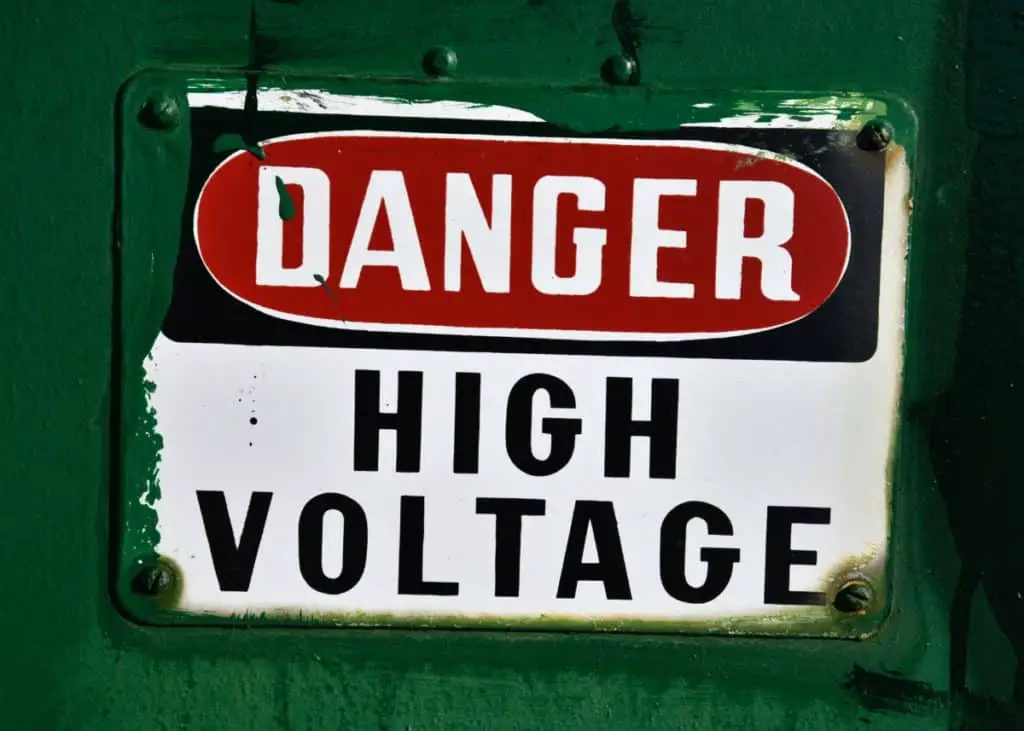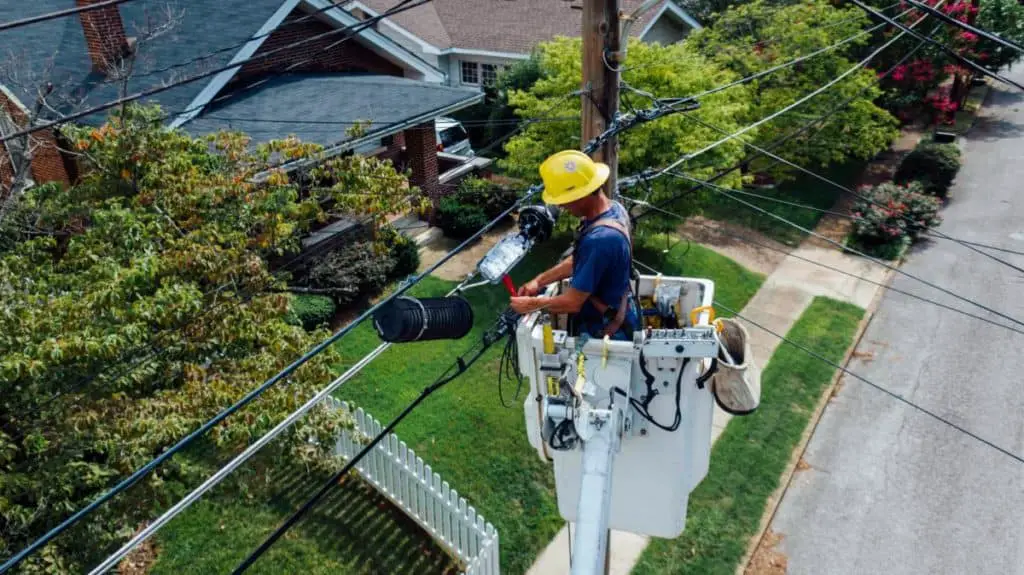Electricity has so many incredible uses in the modern world, unfortunately it is also an incredibly dangerous form of energy. As electricians we must take special precautions during our working day to prevent seriously injuring ourselves and others.
It’s no surprise, that a common question would be sparkys have is, is being an electrician a dangerous job? In this article we will take a look at the biggest risk factors involved in our career and the dangers we come up against on a daily basis.

Overall, being an electrician is a very dangerous job. However, we have procedures and training in place to ensure that we manage and reduce these risks to prevent harm. Some of the dangers that we face are not as obvious as you may think.
If you are reading this with the hope of becoming an electrician, remember, although these dangers may look intense we are able to significantly reduce the risks by the way we cary out our work.
Unfortunately, even with all the safety measures in place, accidents do still occur. When they do, being an electrician can certainly be a dangerous job.
Do Electricians Get Electric Shocks?
This may seem like an obvious question to ask but is actually a really important one. Anyone who has received a mild electric shock, or ‘belt’ as it’s sometimes called, will know it is not a pleasant experience!
As electricians we get very few electric shocks due to the fact that we are very careful to prevent accidents from occurring. Electricity can be lethal and even a mild shock signifies that something has gone extremely wrong in our procedures.
Any aspiring sparky will learn from day one that safety is the number one priority. Even a small shock has the potential to cause death.
Electric shocks are a very dangerous part of the job. As we move up the voltage range that we are working with, the risks for even small mistakes get magnified.
An electrician working on an 11,000 volt system has no margin for mistakes. The procedures in place become even more strict, for example a Senior Authorised Person is used to carry out the isolation of the energy.
As well as the danger of electric shocks, electricians also have the danger of working at height to contend with
Do Electricians Have To Work At Height?
When you picture an electrician you may be imagining someone stood on top of a step ladder changing a light fitting. This is a type of working at height, all be it a relatively small one.
It goes without saying that any type of working at height is dangerous. Falling from a small step ladder can result in some pretty bad injuries. The danger increases as the height increases.

One of the things that surprised me when I became an electrician is how high up I find myself working a lot of the time!
Electricians will often have to work high up in the air. This can vary from standing on a step ladder, to being several metres from the ground in a mobile elevated work platform (MEWP). The type of role you choose will have a large bearing on how often your feet stay on solid ground.
All electricians must be happy working a few metres up on a step ladder or small scaffolding.
Changing lights is part and parcel of the job. An electrician who refuses to go this high up will be severely limiting their employment opportunities.
Climbing in and out of loft spaces or reaching high above suspended ceilings is all part and parcel of an ordinary days work. Be warned though, there are other tasks which require us work a lot higher up!
During my career I have had many occasions when I have needed to drive a MEWP (sometimes referred to as a cherry picker) For example when changing street lighting heads, or running services at heigh level out of harms way.
I have known electricians who dislike heights and generally this isn’t a problem. There are often enough willing volunteers to save the poor sole from having to face their fear!
In smaller work groups this may be more of a problem. From my experience I wouldn’t let a fear of heights stop you from becoming an electrician though as I know plenty who manage just fine.
Choosing the correct career path will have a large bearing on how high you have to work as an electrician. If you choose to become a linesman (the guys and girls who climb the poles to maintain the cables) it would make sense for you to have a head for heights.
It won’t surprise readers to now learn that we limit the dangers by the procedures and safety measures we put in place when working at heigh level.
- On step ladders we try to maintain 3 points of contact on the ladder at all times ie. both feet and one hand. (correct step ladder use can be found here)
- We complete training courses to operate MEWPs and to build temporary scaffoldings safely and correctly.
- Additional PPE (personal protective equipment) is worn when working at height, such as a harness, lanyard and hard hat.
Working at height is a dangerous part of being an electrician. More people die from falls each year in the construction industry than from any other reason, as demonstrated on the HSE website here
Whilst electric shocks and falling from hight are dangers that occur daily, there is also the danger of physical injury that occurs when doing a physically demanding job, often in high risk environments.
Do Electricians Get Injured A Lot?
Being an electrician is a physically demanding job. As such, physical injuries are a dangerous, and unfortunately common, part of the career.
In my experience, electricians don’t often get seriously injured as a lot of safety procedures are in place to prevent serious accidents. However, little niggling injuries, such as bad knees or pulled muscles, are common among those in the trade.
There are inherent dangers when doing any physically demanding job and being a sparky is no exception.
Cable drums are surprisingly heavy, getting in and out of lofts put stresses and strains on lesser used muscles, and squeezing into tight spaces has the potential for cuts and nicks to all parts of our bodies.
I have visited a physio many times to have work done correcting issues that are caused by my career. When we rely on our physical abilities to perform our jobs, the consequences of getting injured can be serious.
Whilst getting injured is definitely a danger to being an electrician, in my option having a physically demanding job is also good for our bodies. It allows us to keep our bodies as well as our minds active on a daily basis.
I have worked with many electricians who are approaching retirement age. Far from the career having a negative effect on their physical health – it has done the opposite, keeping them fit and healthy.
As with the other dangers, we have controls and tools that help prevent injuries. There are so many mechanical and electrical aids now to help us, such as winches and drills, that the role is far less physically dangerous.
We are also trained in the correct way to carry out tasks, such as manual handling, as this video demonstrates:
Anyone who exercises regularly will understand that niggles and slight injuries are part of having an active life.
Of course, sometimes injuries can be more severe. Fortunately (in the UK at least) safety on all sites is taken extremely seriously and many accidents are prevented.
Whilst injuries are a very real danger to electricians, when they occur they are a sign that the controls that we have in place have failed. Often you find it is when someone has chosen to do something reckless and suffered the consequences.
Final Thoughts
In my experience, being an electrician is an incredibly dangerous job and requires someone who is sensible and reliable at all times.
By following well established safety procedures, we are able to manage this high danger and bring the risk down to a level which is acceptable.
Accidents do still unfortunately happen in our trade, but they are becoming less and less frequent as the safety aspect of the career takes on a much greater role.
